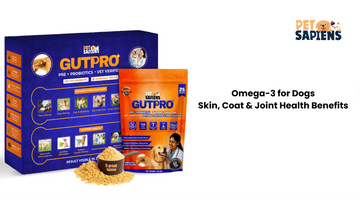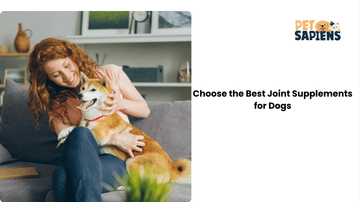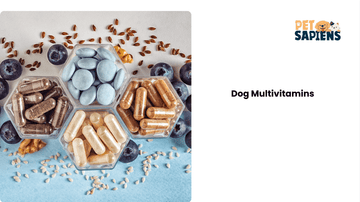
Every pet parent wants their furry friend to live a healthy, vibrant life. At PetSapiens, we understand that proper nutrition is the foundation of your dog's well-being. Just like humans, dogs can benefit tremendously from omega-3 fatty acids – essential nutrients that play crucial roles in maintaining optimal health throughout their lives.
Omega-3 fatty acids are polyunsaturated fats that dogs cannot produce naturally in their bodies, making supplementation or dietary sources essential. These powerful nutrients support everything from a lustrous coat to strong joints, making them one of the most important additions to your dog's daily nutrition routine.
Understanding Omega-3 Fatty Acids for Dogs
Omega-3 fatty acids consist of three primary types: EPA (eicosapentaenoic acid), DHA (docosahexaenoic acid), and ALA (alpha-linolenic acid). Each plays distinct roles in your dog's health:
EPA (Eicosapentaenoic Acid) serves as nature's anti-inflammatory compound, helping reduce joint pain and supporting cardiovascular health. This fatty acid is particularly beneficial for senior dogs experiencing arthritis or mobility issues.
DHA (Docosahexaenoic Acid) is crucial for brain development and cognitive function. Puppies require adequate DHA for proper neural development, while senior dogs benefit from its neuroprotective properties that may help prevent cognitive decline.
ALA (Alpha-Linolenic Acid) is found in plant sources and can be partially converted to EPA and DHA in the body, though this conversion is limited in dogs compared to direct marine sources.
The optimal ratio and source of these fatty acids can significantly impact their effectiveness in your dog's system. Marine-based omega-3s from fish oil typically provide the most bioavailable forms of EPA and DHA.
Comprehensive Health Benefits of Omega-3 for Dogs
Skin and Coat Health Benefits
Omega-3 fatty acids work from the inside out to create visible improvements in your dog's appearance. These essential fats help maintain the skin's natural barrier function, reducing moisture loss and preventing irritation from environmental allergens.
Dogs receiving adequate omega-3 supplementation typically show noticeable improvements in coat shine and texture within 6-8 weeks. The anti-inflammatory properties of EPA help reduce skin irritation, while DHA supports the production of healthy skin cells. This combination results in a softer, more lustrous coat that's less prone to excessive shedding and dryness.
For dogs with allergies or sensitive skin, omega-3s can provide significant relief from itching and inflammation. The fatty acids help regulate the immune system's response to allergens, reducing the severity of reactions that commonly manifest as skin problems.
Joint Health and Mobility Support
As dogs age, joint health becomes increasingly important for maintaining quality of life. Omega-3 fatty acids, particularly EPA, possess powerful anti-inflammatory properties that can help reduce joint inflammation and associated pain.
Regular omega-3 supplementation may help slow the progression of arthritis and other degenerative joint conditions. The fatty acids work by reducing the production of inflammatory compounds that contribute to cartilage breakdown and joint discomfort.
Many pet owners report noticeable improvements in their senior dogs' mobility and activity levels after consistent omega-3 supplementation. Dogs may show increased willingness to play, climb stairs, or engage in physical activities they previously avoided due to discomfort.
Cardiovascular and Brain Health
Omega-3 fatty acids support cardiovascular health by helping maintain healthy blood pressure and improving circulation. These benefits are particularly important for larger breeds prone to heart conditions and senior dogs experiencing age-related cardiovascular changes.
The brain health benefits of DHA extend throughout a dog's life. Puppies require adequate DHA for proper cognitive development, while adult and senior dogs benefit from its neuroprotective effects. Some studies suggest that omega-3 supplementation may help maintain cognitive function in aging dogs and potentially slow the progression of canine cognitive dysfunction.
Immune System Support
A balanced omega-3 intake helps regulate immune system function, reducing excessive inflammatory responses while maintaining the body's ability to fight infections and diseases. This balance is particularly important for dogs with autoimmune conditions or chronic inflammatory diseases.
1) Pet Supplement for Daily Nutrition — Topper & Multivitamin
All-in-one daily topper with essential omega-3s, vitamins, and minerals — supports coat, joints, digestion, and energy.
PetSapiens’ Daily Nutrition Supplement is a comprehensive daily multivitamin topper formulated to fill dietary gaps in your dog’s nutrition. Beyond essential vitamins and minerals, it provides high-quality omega-3 fatty acids to support skin, coat, and joint health. This palatable powder is designed for easy integration into daily meals, making optimal nutrition effortless.
Key Benefits
-
Complete nutritional support: Fills gaps in regular diets with essential vitamins, minerals, and superfoods.
-
Omega-3 fatty acids for skin, coat, and joint health: EPA and DHA reduce inflammation, improve fur shine, and support joint mobility.
-
Digestive support: Prebiotics and probiotics in the formula aid nutrient absorption for maximum benefit.
-
Immune system enhancement: Spirulina, vitamin C, and E strengthen natural defenses.
-
Palatable, easy-to-use powder: Can be sprinkled over wet or dry food, ideal for picky eaters.
-
Suitable for all ages & sizes: Puppy to senior — one scoop meets daily nutritional needs.
Usage Recommendations
-
Sprinkle over your dog’s regular food according to weight-based dosing:
-
-
Small pets (<10 kg): ¼ scoop daily
-
Medium pets (10–25 kg): ½ scoop daily
-
Large pets (>25 kg): 1 scoop daily
-
-
-
Can be combined with other supplements, including probiotics, for full-spectrum wellness.
Why It’s Ideal
Combining omega-3s with a comprehensive multivitamin ensures pets receive both targeted fatty acid support and overall nutritional coverage. Regular use promotes a shiny coat, healthy joints, enhanced energy, and immune resilience.
2) Pet Supplement for Gut Health — Pre + Probiotics
Targeted pre + probiotic blend to optimize digestive health, boost immunity, and enhance nutrient absorption, including omega-3s.
A healthy gut is essential for optimal nutrient absorption, including omega-3 fatty acids. PetSapiens’ Gut Health Supplement combines 12 probiotic strains with natural prebiotics to support digestive balance, reduce inflammation, and improve overall wellness. By promoting a healthy gut microbiome, this formula ensures that pets fully benefit from dietary omega-3s.
Key Benefits
-
Supports gut microbiome balance: 12 strains including Saccharomyces boulardii and lactic acid bacilli restore intestinal flora.
-
Enhances nutrient absorption: Prebiotics such as FOS, MOS, chicory root, and papaya powder improve omega-3 bioavailability.
-
Immune system support: Balanced gut flora reduces susceptibility to infections and seasonal allergies.
-
Reduces digestive upset: Helps relieve gas, bloating, and irregular stools.
-
Anti-inflammatory support: Natural botanicals reduce gut inflammation and support skin comfort.
-
Safe & natural: No artificial flavors, preservatives, soy, corn, or dairy.
Usage Recommendations
-
Small pets (<10 kg): ¼ scoop daily
-
Medium (10–25 kg): ½ scoop daily
-
Large (>25 kg): 1 scoop daily
-
Ideal for pets recovering from antibiotics, changing diets, or suffering from digestive sensitivities.
The Omega-3 Connection
Proper absorption of omega-3 fatty acids depends on a balanced gut. A healthy microbiome supports fat digestion, prevents nutrient loss, and reduces inflammatory responses that can diminish the benefits of omega-3s. Using the Gut Health Supplement alongside omega-3-rich diets ensures pets experience the maximum benefits for skin, coat, and joint health.
Omega-3 Sources & Quality Considerations
|
Source Type |
EPA Content |
DHA Content |
Bioavailability |
Best For |
|
Fish Oil |
High |
High |
Excellent |
All dogs, especially seniors |
|
Krill Oil |
Moderate |
Moderate |
Excellent |
Dogs with sensitivities |
|
Flaxseed Oil |
Low (ALA) |
None |
Poor conversion |
Vegetarian option |
|
Algae Oil |
Low-Moderate |
High |
Good |
Dogs with fish allergies |
|
Salmon Oil |
High |
Moderate |
Excellent |
Skin and coat improvement |
Quality Tips:
-
Look for third-party tested products specifying EPA & DHA content.
-
Ensure sustainable sourcing practices and absence of heavy metals or PCBs.
-
Pair omega-3 supplements with digestive support for maximum efficacy.
Complementary Benefits
-
Daily Nutrition Topper: Provides the omega-3 foundation along with vitamins, minerals, and superfoods for all-around health.
-
Gut Health Supplement: Ensures omega-3s and other nutrients are fully absorbed, reduces digestive inflammation, and supports the gut-skin axis.
- Combined effect: Shiny coat, comfortable joints, balanced digestion, stronger immunity, and overall vitality.
Dosage Guidelines and Safety Considerations
Proper dosing of omega-3 supplements depends on your dog's weight, age, and specific health needs. General guidelines suggest 20-55mg of combined EPA and DHA per pound of body weight daily, but consulting with a veterinarian is always recommended.
Small Dogs (Under 25 lbs): 200-500mg combined EPA/DHA daily
Medium Dogs (25-50 lbs): 500-1000mg combined EPA/DHA daily
Large Dogs (50-100 lbs): 1000-2000mg combined EPA/DHA daily
Giant Breeds (Over 100 lbs): 2000-3000mg combined EPA/DHA daily
Start with lower doses and gradually increase to allow your dog's digestive system to adjust. Some dogs may experience mild digestive upset when first beginning omega-3 supplementation, but this typically resolves within a few days.
Signs Your Dog May Benefit from Omega-3 Supplementation
Several indicators suggest your dog might benefit from increased omega-3 intake:
Skin and Coat Issues: Dull, brittle coat, excessive shedding, dry or flaky skin, hot spots, or persistent itching may indicate inadequate omega-3 levels.
Joint Stiffness: Difficulty rising, reluctance to exercise, limping, or general mobility issues, especially in senior dogs, may improve with omega-3 supplementation.
Allergies: Dogs with environmental or food allergies often benefit from the anti-inflammatory effects of omega-3 fatty acids.
Cognitive Changes: Senior dogs showing signs of confusion, disorientation, or changes in sleep patterns may benefit from DHA supplementation.
Integrating Omega-3s into Your Dog's Routine
Successfully incorporating omega-3 supplements requires consistency and patience. Results typically become noticeable after 4-6 weeks of regular supplementation, with maximum benefits often seen after 2-3 months.
Best Practices:
- Administer with meals to improve absorption and reduce digestive upset
- Store supplements in cool, dark places to prevent rancidity
- Monitor for any adverse reactions, especially when starting new supplements
- Maintain consistent daily dosing for optimal results
- Consider rotating between different omega-3 sources for variety
The PetSapiens Approach to Canine Wellness
At PetSapiens, we believe that pets are family members deserving the best possible care. Our commitment extends beyond providing quality products to supporting the entire pet community through our 1% revenue donation program and shelter support initiatives.
Our carefully curated supplement selection focuses on addressing real nutritional needs rather than following trends. Each product undergoes thorough evaluation to ensure it meets our standards for quality, safety, and effectiveness.
The upcoming veterinary consultation services and wellness programs will further support pet parents in making informed decisions about their dogs' nutritional needs, including optimal omega-3 supplementation strategies.
Frequently Asked Questions About Omega-3 for Dogs
How long does it take to see results from omega-3 supplementation?
Most dogs show initial improvements in coat quality within 4-6 weeks of consistent supplementation. Joint health benefits may take 8-12 weeks to become noticeable, while cognitive benefits require longer-term supplementation.
Can I give my dog human omega-3 supplements?
While not toxic, human supplements aren't formulated for canine needs and may contain additives unsuitable for dogs. Pet-specific formulations ensure appropriate dosing and safety.
Are there any side effects of omega-3 supplementation?
Omega-3 supplements are generally safe, but some dogs may experience mild digestive upset initially. Very high doses can potentially affect blood clotting, so veterinary guidance is important.
How do I know if my dog is getting enough omega-3?
Signs of adequate omega-3 levels include a shiny coat, healthy skin, good mobility, and overall vitality. Your veterinarian can assess your dog's specific needs.
Can puppies take omega-3 supplements?
Yes, puppies benefit from omega-3s, especially DHA for brain development. Use puppy-specific formulations and follow veterinary guidance for appropriate dosing.
Should I stop omega-3 supplements before surgery?
Omega-3s can affect blood clotting, so inform your veterinarian about all supplements before any surgical procedures. They may recommend temporarily discontinuing supplementation.
What's the difference between fish oil and krill oil?
Both provide EPA and DHA, but krill oil contains astaxanthin (an antioxidant) and may be better absorbed. Fish oil is typically more cost-effective for equivalent omega-3 content.
Can omega-3s help with my dog's allergies?
The anti-inflammatory properties of omega-3s may help reduce allergy symptoms, particularly skin manifestations. However, they work best as part of a comprehensive allergy management plan.
How should I store omega-3 supplements?
Store in cool, dark places away from heat and light. Refrigeration can extend shelf life. Check expiration dates regularly and discard rancid-smelling products.
Are plant-based omega-3s effective for dogs?
Dogs convert plant-based ALA to EPA and DHA inefficiently. Marine sources provide more bioavailable omega-3s for optimal health benefits.
Conclusion
Omega-3 fatty acids represent one of the most beneficial nutritional additions to your dog's diet. From promoting a lustrous coat and healthy skin to supporting joint mobility and cognitive function, these essential fats address multiple aspects of canine wellness.
The key to success lies in choosing high-quality supplements, maintaining consistent dosing, and taking a comprehensive approach to your dog's nutritional needs. PetSapiens' carefully selected supplement range, including the Daily Nutrition Topper and Gut Health Probiotic, provides convenient options for incorporating omega-3s into your dog's wellness routine.
Remember that every dog is unique, and optimal supplementation strategies may vary based on age, size, health status, and individual needs. Working with your veterinarian ensures the best possible outcomes for your furry family member.
By prioritizing omega-3 supplementation as part of a holistic approach to canine health, you're investing in your dog's quality of life and potentially extending their healthy, active years. At PetSapiens, we're committed to supporting this journey with quality products, reliable information, and a shared dedication to the well-being of all pets.


